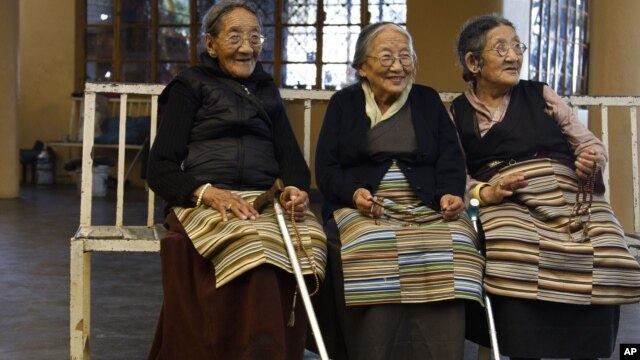
Exile Tibetan women sit on a bench after praying at the Tsuglakhang temple in Dharmsala, India, September 26, 2012.
Tibetan exiles from around the world are meeting this week in the northern Indian town of Dharamsala to discuss the plight of Tibetan people under Chinese rule of their homeland.
The four-day meeting comes just weeks before China holds a once-a-decade transfer of power. And some wonder if the man slated to become China's next leader may have a soft spot for Tibet.
Not much is known about how Xi Jinping, currently China's vice president, feels about China's Tibet policies, though he has expressed Beijing's routine disdain for its exiled leader, the Dalai Lama.
But some point out that Xi's later father and former vice premiere, Xi Zhongxun, had a close relationship with the Dalai Lama in the 1950s, before the spiritual leader left for exile in India.
The elder Xi became known as a leader who was sympathetic towards minorities, including Tibetans. And some speculate that the younger Xi's respect for his father could lead him to more reformist views on Tibet.
Lobsang Sangay, the prime minister of Tibet's government-in-exile, says he is always optimistic that change can come to Tibet. But he does not expect much from China's leadership transition.
"On the one hand, even after 50 years of experience we are not that optimistic because the Chinese government has continued to maintain hard-line policies on Tibet, except for a brief period in the early 80s being good," said Lobsang Sangay. "But as human beings, one should remain hopeful and with new personnel hopefully there will be a new perspective and policies on Tibet, as well."
Since March 2009, 51 Tibetans have set themselves on fire, most if not all to protest what they see as China's campaign of religious and political persecution in their homeland.
China, which calls the self-immolations acts of terrorism meant to incite separatism, has cracked down even harder as a result of the protests, a policy that seems to be provoking only more anger in Tibet.
Robert Barnett, the director of Columbia University's Modern Tibet Studies program, tells VOA it is impossible to know whether the unrest will prompt China's secretive Communist Party leadership to change course on its Tibet policies.
"I don't think it can be ruled out," he said. "I think the way the Chinese leadership makes decisions is probably not the purely logical way we think of when we think of more transparent systems. They bargain off different issues.
"If you're a hardline leader, and you have to placate somebody of another faction in order to get your son a job or an appointment in America or something, you might move on some smaller issue like Tibet and allow them to change policy there because they say it's going to improve China's foreign image," continued Barnett. "Something quite unrelated might ease up a stalemate in China over Tibet policy."
Barnett says the Dalai Lama's willingness to remain open for negotiations may someday pay off. And even though there are no signs that Beijing is currently willing to make concessions, he says that "having the door open is a good idea."
But leaders meeting in Dharamsala this week are likely to feel increasing pressure by some Tibetans to abandon the Dalai Lama's so-called "Middle Way" approach to handling the situation. Many say the policy has only resulted in a tougher response from China.
Barnett says the only way to convince some Tibetan factions of the success of the Dalai Lama's policy may be to argue that the arrival of new leadership in China will also bring about new, more peaceful ways of dealing with Tibet. |
|
